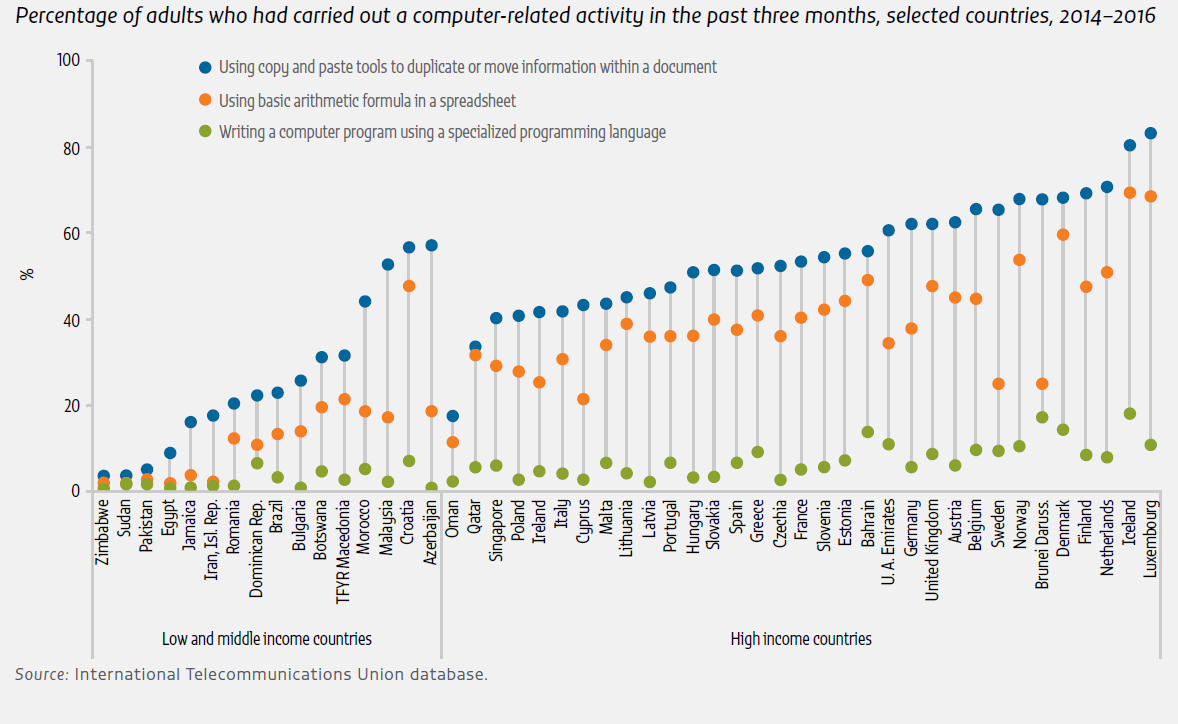Target 4.4 – Skills for work
Key Messages
- Most adults in low and middle income countries do not have even basic computer skills. In 2014–2016, only 4% of adults in Sudan and Zimbabwe could copy and paste files, while 2% to 4% in Egypt, the Islamic Republic of Iran, Jamaica and Pakistan could use basic arithmetic formulas in a spreadsheet.
- There are wide gender gaps even in simple ICT skills. About 75 women for every 100 men could use basic arithmetic formulas in a spreadsheet in Italy, Germany and the Netherlands.
- Adult ICT and digital literacy skills can be assessed either indirectly, by self-reporting, or directly, by testing.
- Comparing the two shows that indirect assessments, the basis for the global indicator, capture only basic skills levels.
- Skills for work are commonly acquired outside formal education, e.g. in the community or workplace, and throughout life. Governments need to ensure that provision is of good quality and that qualifications and
certificates correspond to the skills workers have and employers need. - Establishing regulations and accreditation processes for skills training providers, public and private, is important for accountability but requires resources and expertise many countries lack.
- Many countries have introduced elements of a quality assurance system to strengthen accountability in skills development. A review of 20 low and middle income countries showed that 6 had no experience of
any regulatory mechanism for non-government training provision and 9 had no experience of a functioning information system to improve system performance.
Identifying skills for work that remain relevant in all contexts is prohibitively complex, so the monitoring framework for target 4.4 focuses on information and communications technology (ICT) and digital literacy skills. Focusing on outcomes for a particular skill can shift policy-makers’ attention to the different routes for acquiring them. These are commonly found outside formal education systems.
Assessment of skills acquisition can be direct – preferable, but costly – or indirect, for example via household survey data. A comparison of direct and indirect measures using Eurostat data and results of the OECD’s Programme for the International Assessment of Adult Competencies (PIAAC) showed that the two types of measures were positively correlated, although correlations were higher at lower skill levels.
According to data on the global indicator, adults had not performed even basic computer tasks in low and middle income countries. For example, only 4% of adults in Sudan and Zimbabwe could copy and paste files (Figure 11).
Regarding more sophisticated skills, the disparity among countries is considerable. Within the European Union, 1% of Bulgarian adults could write computer programmes, compared with 14% in Denmark. Gender disparity is also high. In Czechia and Hungary, about 25 women had programming skills for every 100 men. Few countries achieve parity even in simpler skills: In Italy, Germany and the Netherlands, about 75 women for every 100 men could use basic arithmetic formulas in a spreadsheet.
See previous year’s report on Target 4.4


